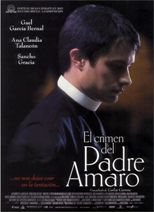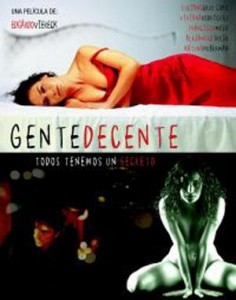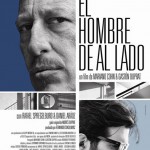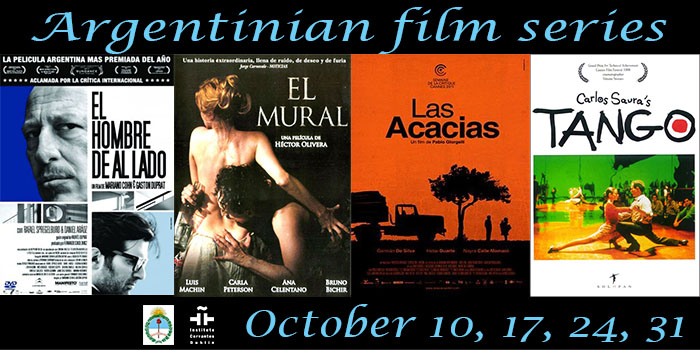Blog del Instituto Cervantes de Dublín
Torre Martello
Cine / Film screening: El hombre de al lado / The man next door
Comenzamos un nuevo ciclo de cine con algunas de las mejores películas de la cinematografía argentina de los últimos años. Te esperamos hoy a las seis en el Café Literario.
El hombre de al lado narra un conflicto entre vecinos que parece no tener fin. Una simple pared medianera puede dividir dos mundos, dos maneras de vestir, de comer, de vivir. De un lado Leonardo (Rafael Spregelburd), fino y prestigioso diseñador que vive en una casa realizada por Le Corbusier. Del otro lado Víctor (Daniel Aráoz), vendedor de autos usados, vulgar, rústico y avasallador. Víctor decide hacer una ventana para tener más luz, y ahí empieza el problema: cada uno toma conciencia de la existencia del otro.
Película seleccionada para los Premios Goya como Mejor película extranjera de habla hispana.
We start a new cinema series today with the screening of some of the best and most recent Argentinian films. The first film will be shown today at 6pm at Café Literario.
A small incident over two neighbours common wall sparks a conflict which affects the intimacy of the view over the chimney; the protagonist sparks a conflict and with paranoiac obsession destroys everyday life.
In the Argentine black comedy The Man Next Door privacy becomes an issue for the main character, Leonardo, whose home happens to be the Curutchet house inLa Plata, Argentina, which was designed by Le Corbusier in 1949.
Living in a design icon certainly has its drawbacks. It’s bad enough that Leonardo has to deal with pushy tourists who constantly ask for tours, but then his neighbor Victor attempts — without Leonardo’s permission — to build a window in a dividing wall between the two houses, to get more sunlight. The window, to Leonardo’s horror, would allow the rather boorish Victor to see all the intimate details of Leonardo’s family’s life.
Goya Awards nomination for best Spanish Language Foreign Film.
Nuevo ciclo de cine argentino en el Cervantes de Dublín / Argentinian Film series at #ICervantes #Dublin
Mañana miércoles comienza el nuevo ciclo de cine argentino en el Instituto Cervantes de Dublín, ofrecido por la Embajada de Argentina en Irlanda.
El cine argentino ha sido históricamente una de las tres filmografías más desarrolladas dentro del cine latinoamericano, junto a las producciones mexicanas y brasileñas.
Así, el cine creado en Argentina durante el siglo XX se convirtió en uno de los principales embajadores del idioma español por el mundo. La bandera de Argentina, del año 1897, se podría considerar como la primera obra cinematográfica nacional y desde su estreno hasta nuestros días han llegado a las pantallas cerca de 2500 películas argentinas con gran éxito de crítica y público, siendo La historia oficial (1985) y El secreto de sus ojos (2009) ganadoras del Oscar a la Mejor Película Extranjera.
En este ciclo podrás ver películas muy recientes como El hombre de al lado (2010), El mural (2010) o Las acacias (2011).
El ciclo será inaugurado mañana, 10 de octubre a las 18h con una recepción por cortesía de la Embajada de Argentina en Irlanda.
Come and enjoy the four films screened in this series offered by the Embassy of Argentina and Instituto Cervantes Dublin.
You will be able to see how Argentine cinema has been historically one of the three most developed productions of Latin American cinema, followed by Mexican and Brazilian production.
This way, the variety of films produced in Argentina during the 20th century bacame one of the most important ambassadors of the Spanish language all over the world. La bandera de Argentina (1897) could be considered the first national cinematographic piece and since its premiere, nearly 2500 argentine films have reached theatre screens with great acclaim from both critics and audiences.
Worth mentioning are La historia oficial (1985) and El secreto de sus ojos (2009), both awarded an Oscar for Best Foreign Language Film.
You could enjoy of recent films such as The man of next door (El hombre de al lado, 2010), El mural (The mural, 2010) or Las acacias (2011).
The Embassy of Argentina offers a wine reception on the opening of the film series, in October 10th at 6 pm.
La biblioteca te propone: cine mexicano.
 Este mes de septiembre os ofrecemos el ciclo de cine “Grandes figuras del cine mexicano” con la proyección de algunas películas de la llamada época de oro. Por ello, nuestro tema del mes es el cine de México, una de las cinematografías más potentes de Sudamérica junto con las de Argentina y Brasil.
Este mes de septiembre os ofrecemos el ciclo de cine “Grandes figuras del cine mexicano” con la proyección de algunas películas de la llamada época de oro. Por ello, nuestro tema del mes es el cine de México, una de las cinematografías más potentes de Sudamérica junto con las de Argentina y Brasil.
Desde principios de los años 30 del siglo pasado y durante aproximadamente un cuarto de siglo, México fue cuna de una de las producciones cinematográficas más pintorescas y variadas. Durante esos años fue uno de los países con mayor número de realizaciones, diversidad de géneros y directores de cine.
El cine nacional también recibió el impulso de diversos proyectos estatales dedicados a la protección de las tradiciones del pueblo indígena. Fruto de estas iniciativas encontramos obras maestras de directores como Emilio Fernández o Fernando de Fuentes.
Se abordaron así más temas y géneros que en ninguna otra época. Obras literarias, comedia, comedias rancheras, películas policíacas, comedias musicales y melodramas, formaron parte del inventario cinematográfico mexicano de aquellos años. También en la recta final de este periodo se inauguró otro género que podría considerarse nacional y que al igual que la comedia ranchera, no tuvo rivales fuera de México. Fue el género de luchas o películas de lucha libre.
This month we offer you a new cinema series at Instituto Cervantes: “Great Figures of Mexican Cinema”. Some of the films of the so-called “Golden Era” will be screened during September in the Café Literario. Therefore our topic for this month is Mexican cinema, one of the most important cinema industries along with Argentina and Brazil.
It all started in the last century, during the thirties and it lasted about a quarter of a century. Mexico was the craddle of one of the more picturesque and varied cinematographies. During those years it produced a great number of films of all kind of genres.
The national cinema also received the impulse of several national projects focussed on the protection of the traditions of indigenous tribes. The result of these initiatives were the masterpieces of directors such as Emilio Fernández or Fernando de Fuentes.
Films were made about a wide variety of topics and genres: literary works, comedies, “ranchera” comedies, crime films, music comedies, dramas…All of them were part of the Mexican cinematographic inventory of those years.
In the final part of this period a new genre emerged and we could consider it a national one. As in the “ranchera” comedy, it was unrivaled outside Mexico. It was the genre of wrestling films.
Cine / Film screening: El secreto de sus ojos
Nueva cita con el mejor cine hoy a las 6 de la tarde en el Café Literario.
En 2005, Eduardo Sacheri publicó la novela La pregunta de sus ojos. La novela fue llevada a la gran pantalla bajo el título El secreto de sus ojos, película que en 2010 ganó el Oscar a mejor película extranjera. Ahora, Instituto Cervantes te trae esa película para que la disfrutes, dentro del marco del Bealtaine Festival.
La historia: Argentina, años 70. Benjamín Espósito es oficial de un Juzgado de Instrucción de Buenos Aires y está a punto de retirarse. Obsesionado por un brutal asesinato ocurrido treinta años antes, decide escribir una novela sobre el caso, del cual fue testigo y protagonista. Reviviendo el pasado, viene también a su memoria el recuerdo de una mujer, a quien ha amado en silencio durante todos esos años.
The best cinema is coming back today at 6pm at Café Literario.
In 2005, Eduardo Sacheri published his novel La pregunta de sus ojos. Years later, a version from the novel was filmed under the name of El secreto de sus ojos, which won the Oscar, in 2010, for best foreign language film. Now, Instituto Cervantes Dublin, brings you the film to enjoy it, as part of the Bealtaine Festival.
The story: Argentina, year 1970. Benjamín Espósito is an official at a Magistrates court in Buenos Aires and he is about to retire. He is obsessed with a brutal murder that took place thirty years ago. He decides to write a novel on the case where he was a witness and main character. While reliving the past he remembers a woman he silently loved all those years.
Juan Diego Botto en la Biblioteca Del Instituto Cervantes Dublín
Juan Diego Botto visitó nuestra biblioteca el pasado 13 de julio para presentar el ciclo de cine argentino organizado en el Instituto Cervantes de Dublín. Juan Diego tuvo la amabilidad de contestar a las preguntas de nuestra compañera Carmen Sanjulián. En nuestro canal de televisión podéis ver la entrevista completa en video.
Juan Diego Botto nació en Buenos Aires en 1975. La situación política de Argentina en aquellos años acabó con la vida de su padre, y el resto de la familia se vio obligada a exiliarse a España cuando Juan Diego tenía cuatro años.
En esta entrevista, tendremos la oportunidad de conocer más detalles sobre la vida de este actor que comenzó su andadura con tan sólo cinco años en la película Juego de Poder de Fausto Canel, de la que, según nos cuenta, tiene tan solo vagos recuerdos. Nunca imaginó que la de actor podría ser su profesión. En aquellos primeros momentos, aquel “juego” era sólo una excusa para no ir al colegio y para conseguir todos los juguetes que salían en la película, como le habían prometido.
Pero conforme fue pasando el tiempo, Juan Diego Botto fue haciendo de la interpretación su vida, hasta llegar a conseguir tres candidaturas a los premios Goya y el premio al Mejor Actor en el Festival de El Cairo.
Juan Diego Botto visited our library last July to present the Argentine film series organized by Instituto Cervantes in Dublin. Juan Diego was kind enough to answer the questions of our colleague Carmen Sanjulián. In our TV channel you can see the full interview on video.
Juan Diego Botto was born in Buenos Aires in 1975. The political situation in Argentina in those years killed his father and the rest of the family was forced into exile in Spain when Juan Diego was four.
In this interview, we will have the opportunity to learn more about the life of this actor who began his career with only five years in the film Juego de Poder directed by Fausto Canel. But he never imagined that acting could be his profession. In those first moments, this “game” was just an excuse to avoid going to school and get all the toys that were displayed in the film, as the producer promised to him.
But as time passed, Juan Diego Botto made of acting his life, until he got three nominations for the Goya Awards and the award for Best Actor at the Festival of Cairo.
Cine / Film Screening: Gente decente
 Para finalizar la II Semana de Cine Chileno, hoy proyectamos la película “Gente Decente” del director Edgardo Vierek.
Para finalizar la II Semana de Cine Chileno, hoy proyectamos la película “Gente Decente” del director Edgardo Vierek.
La película trata de un joven y exitoso abogado que está a punto de casarse pero comete un error fatal que lo lleva a verse involucrado en la misteriosa muerte de una mujer al servicio de clientes adinerados.
A tan solo unos días de su matrimonio, y con todas las pruebas en su contra, deberá buscar al verdadero asesino y limpiar su reputación antes de que sea demasiado tarde, viéndose a cada minuto involucrado en un intrincado laberinto que combina el suspense con momentos de intenso erotismo.
Esperamos que hayáis disfrutado de esta semana de cine, y no os perdáis esta última entrega.
To finish the 2nd Chilean Cinema Week we will show today “Decent People” by Edgardo Vierek.
The movie takes place in Santiago. Andrés Barros is a partner at an up-and-coming law firm. He’s getting married, and his friends, including his partner Roberto, arrange a bachelor party where he spends the night with a prostitute, Gloria.
She later shows up at his office and the passion continues, against his better judgment. Soon, Andrés is entangled in sex, lies, videotape, and blackmail. His relationship with Rosario, his fiancée, is strained, he neglects his work, and there’s a dead body in a bathtub. A pimp, a whore, a doorman, a receptionist: where are the decent people?
We hope that you have enjoyed this cinema week. Don´t miss this last movie!
Cine / Film screening: Promedio rojo
La II Semana de Cine Chileno da un salto de género en su tercera entrega con una divertidísima comedia juvenil. Promedio rojo (2004) es una co-producción chileno-española que logró arrastrar a numerosos espectadores chilenos al cine, poniendo una vez más el punto de mira en la producción cinematográfica nacional. Su director, Nicolás López, a sus solo 29 años, está ya habituado a los éxitos de taquilla con películas como Qué pena tu vida (2010) o Qué pena tu boda (2011).
Promedio Rojo es la primera película chilena que emplea efectos especiales digitales para contar una historia donde se cruzan superhéroes, abuelos muertos sacados de La Guerra de las galaxias y dibujos animados que interactuarán con la realidad.
Hoy, 29 de febrero, a las 18h en Café Literario.
The 2nd Chilean Cinema Season drastically moves to a different genre in its third session with this hilarious teenage comedy. Promedio rojo (2004) is a Chilean-Spanish coproduction which made Chilean audiences go en masse to the cinema and put the spotlight once more on the national film making. The director, Nicolás López, at 29, is already in used to box office hits with films like Qué pena tu vida (2010) and Qué pena tu boda (2011).
Promedio rojo is the first Chilean movie to use digital effects to combine cartoon animation with reality, creating a world in which you can see characters of every type imaginable, from superheroes to grandparents, from the deceased to intergalactic heroes you would expect to see in movies like Star Wars.
Today, February 29th at 6pm at Café Literario.
Bar el Chino: cine en el Instituto / film screening
Proyección cinematográfica / Film Screening
Hoy / Today 11/10/2011 6:00 pm.
Instituto Cervantes
Lincoln House, Lincoln Place
Dublin 2
Sumas y restas / Addictions and Subtractions : cine en el Instituto / film screening
Proyección cinematográfica / Film Screening
Hoy / Today 05/10/2011 6:00 pm.
Instituto Cervantes
Lincoln House, Lincoln Place
Dublin 2
Roma: cine en el Instituto / film screening
Roma se proyectará hoy miércoles 20 en lugar de la fecha previamente anunciada. / In a change to the printed programme, Roma will be shown today, Wednesday 20th July.
Hoy / Today 20/07/2011 6:00 pm.
Instituto Cervantes
Lincoln House, Lincoln Place
Dublin 2
Dos hermanos / Brother and sister
Hoy / Today 19/07/2011 6:00 pm.
Instituto Cervantes
Lincoln House, Lincoln Place
Dublin 2
Martín Hache con Juan Diego Botto en el Instituto Cervantes de Dublín
Proyección cinematográfica / Film Screening
Juan Diego Botto, protagonista de la película, charlará con los asistentes
Hoy / Today 13/07/2011 6:00 pm.
Instituto Cervantes
Lincoln House, Lincoln Place
Dublin 2
Juan Diego Botto en el Instituto Cervantes de Dublín
 Tras la proyeccción de Roma (2004), película dirigida por Adolfo Aristaráin, Juan Diego Botto responderá a las preguntas de los asistentes.
Tras la proyeccción de Roma (2004), película dirigida por Adolfo Aristaráin, Juan Diego Botto responderá a las preguntas de los asistentes.
No te lo pierdas.
Following the screening of Roma (2004), directed by Adolfo Aristaráin, Juan Diego Botto will answer questions from the audience.
Don’t miss it!
The Jameson Dublin International Film Festival: The Latin American season
 The Jameson Dublin International Film Festival, are proud to announce a Latin American season which will present a variety of superb titles.
The Jameson Dublin International Film Festival, are proud to announce a Latin American season which will present a variety of superb titles.
The Latin American Season turns the spotlight on a variety of projects including October, directed by brothers Daniel and Diego Vega Vidal, which focuses on the life of Clemente after he finds a baby. October is a sharply witty Peruvian film which received the prestigious Special Jury Mention in Cannes 2010. Another festival favourite is Preludio. Consisting of one continuous, unbroken shot for its entirety, Preludio is a bot-meets-girl story wonderfully void of any cinematic clichés. Director Eduardo Lucatero will attend the screening.
Other titles include Nostalgia for the Light. Using the Atacama Desert as a departure point, Nostalgia for the Light, part-documentary, part-cinematic essay, concerns a captivating investigation. Abel, which premiered at the Sundance Film Festival, tells the story of a boy who decides to become the father figure of his family in Diego Luna’s debut. Paulo Trapero’s Carancho is about a personal injury lawyer caught up in a cycle of violence, coupled with an engrossing love story set amongst Argentinians.
Another anticipated debut screening at the festival is What I Love the Most directed by Delfina Castagino. What I Love the Most depicts two women in their 20’s pondering their friendship and lives. And screened to great success at last year’s Cannes Festival, The Silent House is a marvelously unique take on the horror genre, filmed in one single continuous shot.
The Jameson Dublin International Film Festival would like to thank its funders and sponsors: Jameson, The Arts Council / An Chomhairle Ealaíon, Bord Scannán na hÉireann / the Irish Film Board, Fáilte Ireland, Cineworld, Renault, The Merrion Hotel, RTÉ 2FM, Windmill Lane, Wells Cargo and Entertainment.ie.
Jameson Dublin International Film Festival
Ticketing Office: Filmbase, Curved Street, Temple Bar, Dublin 2
Tel: 01 687 7974
Web: http://www.jdiff.com/
Email: info(at)jdiff.com
Facebook: Jameson Dublin International Film Festival
Twitter: @DublinFilmFest
Download the new Festival iPhone or Android App
For Special Promotions and Ticket Sales, please keep an eye on http://www.jdiff.com/
Talk with Arturo Ripstein
 Instituto Cervantes in Dublín has the pleasure to show the film “Deep Crimson” from director Arturo Ripstein and Paz Alicia Garciadiego (scriptwriter). They will present the film and after the screening, we will have the opportunity to chat with them.
Instituto Cervantes in Dublín has the pleasure to show the film “Deep Crimson” from director Arturo Ripstein and Paz Alicia Garciadiego (scriptwriter). They will present the film and after the screening, we will have the opportunity to chat with them.
From a true story that had already been taken to the screen –The Honeymoon Killers (1970), a B movie and Truffaut favorite- in the hands of Arturo Ripstein and relocated in Mexico, it has become his masterpiece and won him the international acclaim he long deserved.
The film merges a cruel world, humanized monsters and a black humor that shows up when least expected.
Arturo Ripstein, born in Mexico City in 1943, is the son of a well-known producer. He studied law, history and art history before plunging into a film career in 1962, as an assistant to Luis Buñuel.
In 1965, he directed his first feature, Tiempo de Morir, written by Carlos Fuentes and Gabriel García Márquez, it began a tradition of making independent films written by high-profile Latin-American authors.
In 1997, Ripstein won the National Prize of Arts and Sciences, the second filmmaker after Buñuel to do so.
Paz Alicia Garciadiego is the scriptwriter of many of his films.
Today, 25/11/2010 (18:00 h) at Instituto Cervantes
Lincoln House. Lincoln Place
Dublín 2






